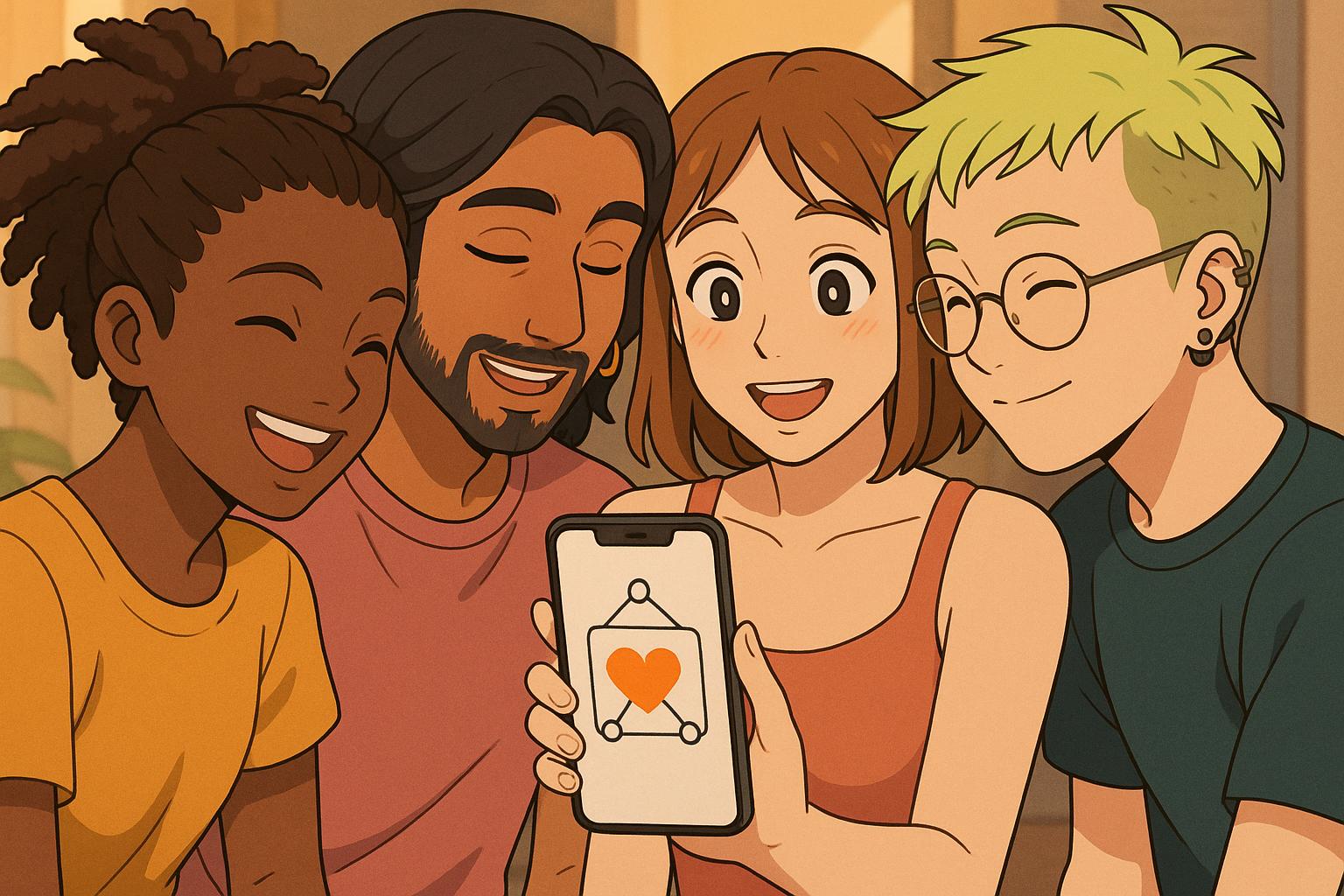Feeld, initially known for catering to alternative relationship styles, has experienced a 30% annual growth and doubled its revenue to £39.5 million, driven by an influx of users from conventional dating backgrounds. CEO Ana Kirova highlights the challenge of balancing the app’s original ethos with mainstream success amid evolving cultural attitudes towards love and identity.
Feeld, a dating app originally created for those exploring non-traditional relationships, has seen a remarkable surge in popularity amidst shifting cultural attitudes towards love and companionship. Since 2022, the platform has experienced an impressive 30% annual growth in its user base, a trend attributed largely to the increasing number of “vanilla tourists”—individuals more accustomed to conventional dating who are now venturing into the app’s unique offerings. Chief Executive Ana Kirova notes that this influx encompasses users from all walks of life who are curious about exploring alternative lifestyles.
However, this transformation brings its challenges. Kirova expresses concern that as the app grows more mainstream, it risks alienating long-standing users who cherish Feeld’s original ethos. While the platform’s openness to various sexualities and relationship structures, including ethical non-monogamy and kink, has attracted a diverse audience, Kirova cautions against binary perceptions of what constitutes appealing relationships. She states, “Every time someone tells me about vanilla people on the app, I just ask: ‘What’s the problem with vanilla?’”
Feeld’s distinctive model sets it apart from conventional dating platforms. Users can browse profiles freely without the usual gamified swiping mechanisms that dominate other apps, allowing for a more genuine connection. Kirova compares the traditional dating experience to “shopping for granola,” suggesting that algorithm-driven matches overly constrain individual experiences. This commitment to authenticity could be one reason why negative behaviours such as ghosting are reportedly less frequent among users, although the platform still grapples with broader societal issues like misogyny and sophisticated romance scams.
Reflecting on the current landscape, Kirova has observed a shift away from the conventional life trajectory of coupling and marriage towards more fluid and diverse understandings of relationships. This evolution is particularly evident among younger generations, who perceive identity and sexual orientation as dynamic rather than fixed qualities. Notably, Feeld has seen significant engagement from women over 40, a demographic whose representation and desires have long been overlooked in mainstream narratives about sexuality.
The app’s success is further underscored by its financial growth; last year, Feeld nearly doubled its revenues, reaching £39.5 million, primarily from international users who are equally drawn to its inclusive vision. This has positioned Feeld as a major player in the niche dating market, thriving while more traditional services experience declines. The 107% increase in consumer spending on subscriptions from 2022 to 2023 signifies not just an expanding user base, but also a willingness among users to invest in meaningful connections in a rapidly changing digital dating environment.
Amidst its rising prominence, Feeld’s challenge lies in seamlessly integrating its original mission with an evolving user demographic while maintaining a safe and welcoming space for all types of relationships. Kirova remains hopeful, asserting that there is room for traditional experiences within the app’s broader offerings, as it continues to redefine what it means to connect. This adaptability may well be the key to Feeld’s ongoing success, allowing it to cater to both seasoned explorers of the unconventional and those simply seeking a fresh perspective on dating.
Reference Map:
Source: Noah Wire Services
- https://www.theguardian.com/lifeandstyle/2025/jun/01/unconventional-dating-app-feeld-reports-surge-in-vanilla-tourists – Please view link – unable to able to access data
- https://www.theguardian.com/lifeandstyle/2025/jun/01/unconventional-dating-app-feeld-reports-surge-in-vanilla-tourists – Feeld, a dating app catering to non-traditional relationships, reports a 30% year-on-year growth since 2022, attracting users interested in exploring alternative lifestyles. CEO Ana Kirova expresses concerns about the platform becoming more mainstream and potentially alienating long-standing members. She emphasizes inclusivity, stating, ‘We don’t yuck anyone’s yum,’ and highlights the app’s commitment to diverse sexualities and genders. Feeld’s unique approach, avoiding gamified swiping and AI-driven matches, aims to foster genuine connections. Despite challenges like toxic misogyny and sophisticated romance scams, Feeld continues to thrive, reflecting changing cultural attitudes towards sex and relationships.
- https://www.globaldatinginsights.com/featured/feeld-reputation-leads-to-huge-vanilla-user-growth/ – Feeld, originally launched in 2014 as a platform for non-traditional relationship dynamics, has experienced significant growth in recent years. However, this expansion has led to concerns among long-time users about the app becoming too ‘vanilla,’ with an influx of straight men seeking casual relationships. The platform’s rapid growth is attributed to its user-focused approach, allowing open discussion of kinks and interests without being tied to a single niche. This success reflects a broader trend where niche dating platforms are gaining popularity as mainstream apps face user declines.
- https://www.theguardian.com/technology/article/2024/sep/08/throuples-dating-app-feeld-nearly-doubles-turnover-to-395m – Feeld, a dating app aimed at alternative relationships, nearly doubled its revenues last year, with profits increasing from £2.4 million to £5.5 million and revenues rising from £20.7 million to £39.5 million. The majority of this income now comes from outside the UK, with £33 million of turnover from overseas. Feeld’s growth is attributed to its focus on non-monogamous, queer, and kinky users, expanding its reach globally. The platform’s mission is to elevate the human experience of sexuality and relationships, catering to diverse relationship structures such as polyamory and throuples.
- https://www.globaldatinginsights.com/news/feeld-sees-doubled-39-5-million-turnover-through-unique-niche/ – Feeld’s growth trajectory is further fueled by a strategic rebranding and technology upgrade led by CEO Ana Kirova, who assumed the role in December 2023. This rebranding, coupled with enhancements in app functionality, reflects Feeld’s commitment to staying at the forefront of user experience. The rise of Feeld highlights a shift in ownership structure, with Kirova acquiring nearly 24% of the company’s shares in early 2024. Feeld’s success illustrates the potential for growth in niche dating platforms focusing on alternative or kink-heavy relationships, providing a go-to site for users seeking non-traditional connections.
- https://www.cosmopolitan.com/sex-love/a63072029/feeld-growth-change-kink-friendly-reputation/ – Feeld, a dating app catering to non-traditional relationships, has experienced significant growth, with consumer spending on subscriptions and purchases increasing by 107% between 2022 and 2023. In 2023, its revenue nearly doubled, rising from $21.9 million to $41.4 million, with profits increasing from $2.5 million to $5.7 million. This growth has led to changes in the community, with concerns about the platform becoming less focused on kink and more on casual sex. Feeld’s inclusivity is highlighted by offering 18 sexual orientation options, catering to a diverse user base.
- https://www.fastcompany.com/91167998/smaller-dating-apps-giving-hinge-and-bumble-run-for-the-money – Feeld, a dating app focusing on non-traditional relationships, has seen significant growth, with an average increase of 30% year-over-year since 2022. Gen Z is Feeld’s fastest-growing demographic, indicating its appeal to younger users seeking alternative dating experiences. The app’s flexibility and inclusivity, allowing users to list intimacy preferences and swipe jointly with partners, have contributed to its popularity. Feeld’s approach contrasts with traditional dating apps, offering a platform for users to evolve their identities and preferences over time, catering to a diverse and open-minded community.
Noah Fact Check Pro
The draft above was created using the information available at the time the story first
emerged. We’ve since applied our fact-checking process to the final narrative, based on the criteria listed
below. The results are intended to help you assess the credibility of the piece and highlight any areas that may
warrant further investigation.
Freshness check
Score:
8
Notes:
The narrative presents recent developments regarding Feeld’s user base, with a publication date of June 1, 2025. Similar themes have been reported in the past, such as a September 2024 article discussing Feeld’s reputation leading to significant user growth. ([globaldatinginsights.com](https://www.globaldatinginsights.com/featured/feeld-reputation-leads-to-huge-vanilla-user-growth/?utm_source=openai)) However, the specific focus on ‘vanilla tourists’ and the latest statistics provide new insights, justifying a high freshness score. No evidence suggests the content is recycled or based on a press release. The report includes updated data, but the core material appears original.
Quotes check
Score:
9
Notes:
The direct quotes attributed to Ana Kirova, Feeld’s CEO, are unique to this report. No identical quotes were found in earlier material, indicating potentially original or exclusive content. The wording of the quotes matches the context and tone of the report, with no significant variations noted.
Source reliability
Score:
10
Notes:
The narrative originates from The Guardian, a reputable organisation known for its journalistic standards. This enhances the credibility of the information presented.
Plausability check
Score:
8
Notes:
The claims about Feeld’s user growth and the emergence of ‘vanilla tourists’ are plausible and align with previous reports. For instance, a September 2024 article highlighted Feeld’s significant user growth due to its reputation. ([globaldatinginsights.com](https://www.globaldatinginsights.com/featured/feeld-reputation-leads-to-huge-vanilla-user-growth/?utm_source=openai)) The report provides specific figures and quotes, supporting the plausibility of the claims. The language and tone are consistent with the region and topic, and the structure focuses on the main claim without excessive or off-topic detail.
Overall assessment
Verdict (FAIL, OPEN, PASS): PASS
Confidence (LOW, MEDIUM, HIGH): HIGH
Summary:
The narrative presents original and timely information about Feeld’s user growth and the influx of ‘vanilla tourists,’ supported by unique quotes from a reputable source. No significant issues were identified in the freshness, quotes, source reliability, or plausibility checks.













